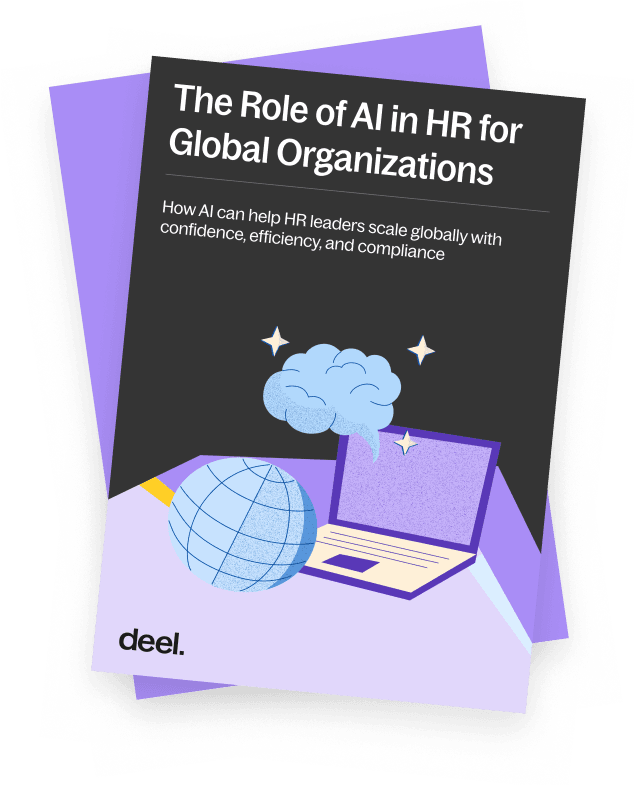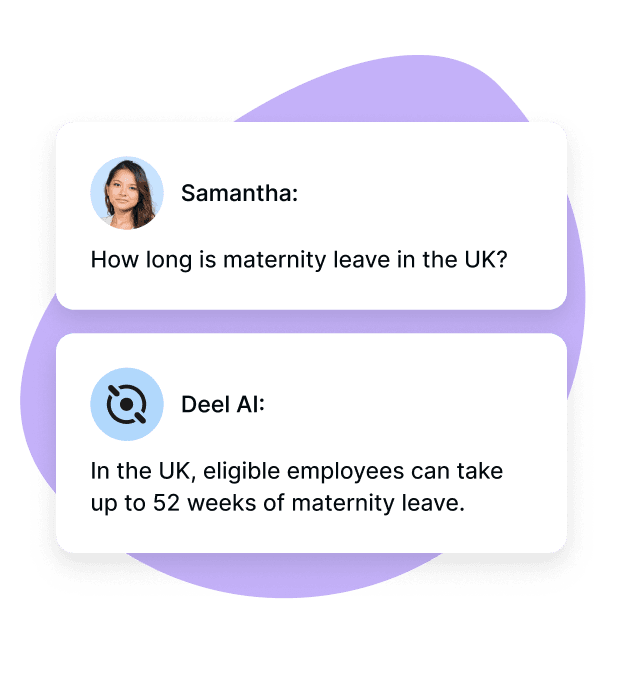Article
8 min read
Redefining ‘Entry-Level’ for the UK’s AI Generation
AI

Author
Matt Monette
Last Update
July 24, 2025

Table of Contents
The AI-driven graduate gap: What’s driving the shift?
The new mandate for HR leaders
The choice HR leaders face
About the author
Matt Monette is the Director, Solutions Consulting, Global Payroll at Deel. He has worked at hyper growth SaaS companies most of his career. Most recently, leading Shopify's UK expansion in London to being the VP of Sales at a late stage startup.
AI is rewriting the rules of entry-level work, and it’s having an unprecedented impact on the next generation of the UK’s workforce. According to new research, vacancies for graduate jobs, apprenticeships, internships, and junior jobs with no degree requirement have dropped 32% since November 2022. The suspected cause: the launch of ChatGPT.
As employers eliminate entry-level roles in a bid to cut costs and increase efficiency, graduates are left facing the toughest job market in years. Industry leaders are signalling that conditions won’t improve, as AI adoption will only continue to grow.
Where will the next generation of leaders come from if today’s graduates struggle to get their foot in the door? To help foster emerging talent in the UK and protect future pipelines, HR leaders have a responsibility to understand the potential scale of AI’s impact and redefine what ‘entry-level’ means in an automated world.
The AI-driven graduate gap: What’s driving the shift?
No single factor can be responsible for something as multifaceted as the job market, and the influence of AI over the graduate gap is still up for debate. The graduate job market tends to shift 10-15% year on year and is subject to various economic factors.
But while AI may not be the only factor, it is certainly a contributing factor with no signs of slowing down:
-
Data from the Tony Blair Institute shows that entry-level positions are down about one-third over two years. Administrative and secretarial roles are the most at-risk, followed by sales and customer service, and professional occupations.
-
Telecom giant BT announced plans to replace up to 10,000 roles with AI by 2030, particularly in customer service and network diagnostics. CEO Alison Kirby has also signalled that as AI capabilities evolve, BT may introduce further cuts.
-
The Big Four accountancy firms (Deloitte, EY, KPMG, PwC) have already confirmed that they’re cutting their graduate intake by 29%, 18%, 11%, and 6% respectively.
-
The result: graduates face the toughest job market since 2018. The UK has fewer job openings available than before the pandemic, making it an outlier compared with the US and most of Europe. Research from the Journal of Computer-Assisted Learning also shows that the gap between skills taught at university and skills needed in the real world is widening. Leaving graduates struggling with digital application, data analysis, AI ethics, and managing digital well-being.
The long-term consequences of neglecting a graduate talent pool can be deeply disruptive. We could face hollowed-out pipelines, capability gaps that are difficult to fill without looking overseas, and stagnating innovation as fresh perspectives and digital-native skillsets are lost. Diversity also suffers when only those who can afford unpaid experience or relocation make it through shrinking entryways.
Over time, this erodes both individual opportunity and national competitiveness. Ignoring graduate talent today puts the workforce of tomorrow at risk. 2024 may have been “the year of investment and optimism”, but now we’re seeing businesses realise that they need a more strategic, human-focused implementation when it comes to AI.
It’s not just graduates and entry-level professionals who are bearing the brunt of this shift. A survey by Orgvue found that 55% of the UK business leaders who made employees redundant as a result of AI adoption regret the decision, admitting that they acted too hastily. Now, 80% are investing in L&D to ensure employees are properly trained in AI, driven by a fear of AI misuse.
Complementary reading

The new mandate for HR leaders
The future of work must be built on the foundations of a partnership between humans and machines, and HR will play a pivotal role in making that a reality. Rather than retreat from graduate hiring, HR teams must rebuild the entry-level pipeline with purpose, redesign roles to reflect modern skills, and create opportunities that are both accessible and future-focused.
1. Rebuild the entry-level pipeline
Entry-level jobs can no longer be defined by repetitive or administrative tasks. Those are already being absorbed by automation. Instead, these roles must prioritise learning agility, collaboration, and critical thinking. That means shifting from a credentials-first mindset to one that evaluates candidates on potential, adaptability, and human skills.
Begin by auditing current entry-level job postings. Are there degree requirements or “one year of experience” clauses that could be barriers without real benefit? Leverage workforce planning tools to anticipate future capability gaps, especially if the graduate pipeline continues to narrow.
Geographic flexibility is also essential. While in-person mentoring and networking have value, the concentration of early-career roles in London shuts out talent who can’t afford to live there on entry-level salaries. Reconsider whether physical presence is always necessary. This could mean launching a fully-remote graduate scheme or piloting hybrid models, such as two weeks in-office for onboarding, followed by remote-first working. The more accessible these roles become, the more diverse and resilient your talent pipeline will be.
2. Prioritise upskilling for early-career professionals
To truly make entry-level work future-ready, it must be rooted in continuous development. Too often, learning and development are reserved for mid-career professionals who are making lateral moves or stepping into leadership roles. But early-career employees, especially in an AI-driven environment, may need learning the most. When L&D is embedded from day one, junior hires gain the tools to evolve with technology instead of being displaced by it.
Upskilling transforms entry-level positions into high-growth pathways, driving retention, engagement, and long-term capability. Tools like Deel Engage make it easier to deliver scalable, targeted learning that aligns with business needs.
This approach both future-proofs the workforce and justifies continued investment in graduate talent. When companies show a commitment to developing people from day one, they attract more diverse, motivated applicants and keep them longer.
It’s unlikely that HR will be able to achieve this alone, and getting buy-in from leadership is essential. For this, it’s important to build a robust L&D strategy that focuses on outcomes and ROI, rather than throwing training materials towards employees and seeing what sticks.
Deel AI
The choice HR leaders face
AI and HR professionals alike are yet to decide definitively whether AI will create more jobs than it cuts - it is simply too early to say. What we’re seeing in the short term is that the rapid adoption of AI tools in UK businesses has made it more difficult for the next generation to break into the new world of work.
But the future of work won’t build itself. It will be shaped by the decisions HR leaders make today. That means choosing to invest in people, not just technology. It means protecting and reimagining entry-level roles, not eliminating them. And it means ensuring that AI adoption is matched by human opportunity. The organisations that do this will lead not just in innovation, but in inclusion, resilience, and long-term success.
Live Demo
Get a live walkthrough of the Deel platform


Matt Monette is the Director, Solutions Consulting, Global Payroll at Deel. He has worked at hyper growth SaaS companies most of his career. Most recently, leading Shopify's UK expansion in London to being the VP of Sales at a late stage startup.
















